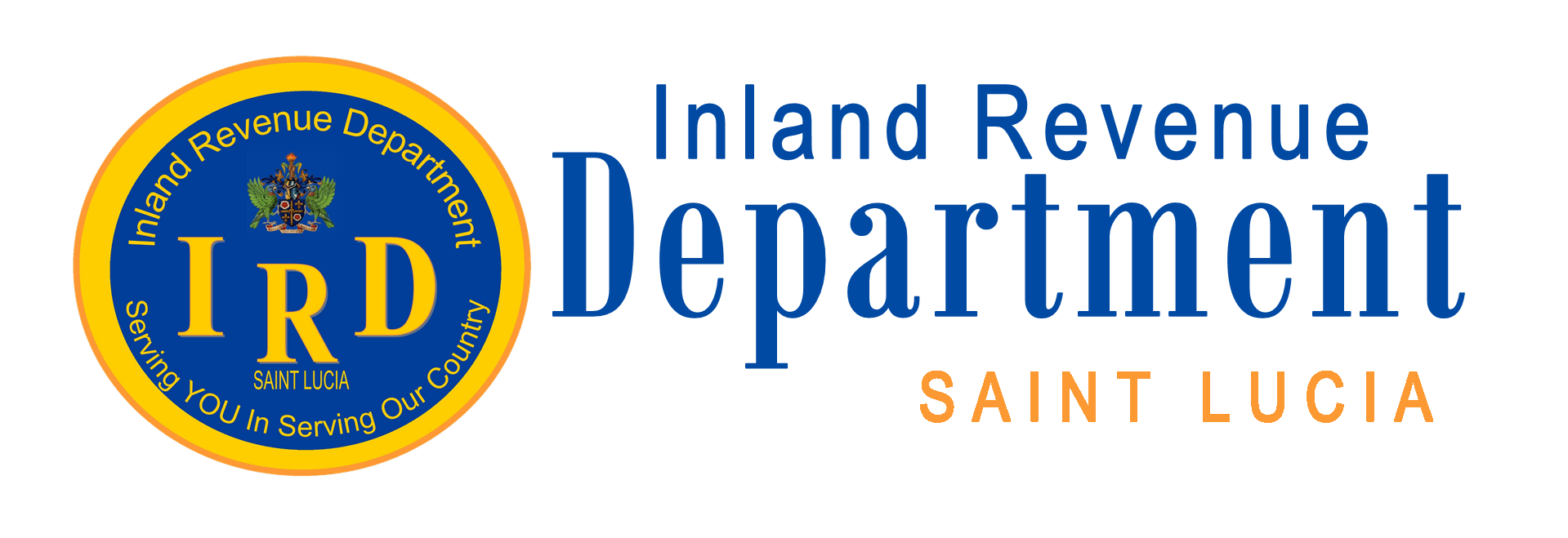Quick Menu
Quick Menu
Income Taxes
Personal Income Tax
The IRD imposes a personal income tax on the income after allowances and deductions of residents and non-residents earning income in St. Lucia. This tax is levied only on income over $18,400 per annum received by resident or non-resident individuals who earn income in St. Lucia, whether those income sources are located in or out of St. Lucia.
A tax return must be filed by individual taxpayers by the due date for filing income tax returns. The due date for filing income tax returns for individuals is 31st March of each year. There is a penalty charged for late submissions, this is 5% on chargeable income. “Chargeable Income,” for the purposes of Income Tax, means the aggregate or total amount of income of any person that is remaining after the appropriate deductions and allowances have been allowed.
Corporate Income Tax
Corporate Tax
Corporate tax is levied on all income received by a corporation from sources in and out of St. Lucia. The due date for submission of income tax returns for Corporations is three months after the end of their financial year.
The residence of a company for tax purposes is determined by the country in which it is managed and controlled. Corporation tax is chargeable on all the profits of a resident company. Profits that accrue directly or indirectly to a non-resident company carrying on a business through a permanent establishment in St. Lucia are subject to corporation tax at 33.3%. Where income accrues to a non-resident company from a source other than from the carrying on of business through a permanent establishment in St. Lucia, the gross amount of such income is liable to withholding tax at 25%.
CIT Rates
All companies are required to pay to the Department on or before March 25, June 25 and September 25 respectively, in each income year, an amount equal to one third (1/3) of the estimated tax for the year. The “estimated tax” is based on the income of the previous year and, more specifically, is calculated according to Schedule 5, Rate of Tax of the Income Tax Act which is as follows:
On the chargeable income, on every dollar thereof, of –
(a) companies existing before the commencement of this Act -
(i) for income year 2003-33%
(ii) for income year 2004 – 32%
(iii) for income year 2005 and subsequent income years – 30%
(b) The rates specified in items (i), (ii) and (iii) are applicable to companies who prior to income year 2003 –
(i) have no arrears of income or any other tax administered by the Inland Revenue Department; and
(ii) have complied with the requirements of any enactment administered by the Inland Revenue department.
Note: If you fail to qualify in 2 (a) i, ii and iii, your tax rate will be thirty-three and a third percent (33.33%).
The remainder of tax as estimated by the company must be paid by March 31 of the following year. In the case of a company whose financial year does not commence in the month of January this outstanding amount must be paid within three months of the end of its financial year.
Any balance of tax which remains unpaid will result in the imposition of a late-payment penalty of ten percent (10%). Interest of twelve and a half percent (12.5%) per annum will also accrue on the outstanding balance.
Pay As You Earn
The Pay-As-You-Earn System, popularly referred to as PAYE, was introduced in St. Lucia in 1965. The legislation dealing with its operation is contained in the Fourth Schedule of the Income Tax Act Chap. 15.02, as well as sections 75, 76, 77, 78 and 143.
With the Pay As You Earn (PAYE) system, money is deducted from paychecks by the employer and remitted to the Government with regular paychecks as they are earned. Any sum taken in excess of the amount of tax due it repaid to the taxpayer. If there is a shortfall between how much tax was paid and how much was actually due, the taxpayer will have to make up the difference once they file their annual Income Tax Return. PAYE is not a method of assessment of income tax, but merely a system of deducting tax from earnings as they are paid. Therefore, although tax has been deducted by way of PAYE from emoluments (earnings), an employee must, nevertheless, file an Income Tax Return.
“Emoluments” means all salary, wages, bonus, overtime, perquisites or privileges which include house allowance and entertainment, commission or other amounts for services, director’s fees, pensions arising or accruing in, derived from or received in St. Lucia, and which is liable to income tax.
This does not include, however, salary or share of profits arising from a trade, profession or vocation carried on by any person either by himself or in partnership with another person.
Contract Tax
Contract tax is levied on income earned from a contractor. A contractor is anyone who is a resident of Saint Lucia who provides or supplies independent personal services in exchange for compensation. A contractor is not considered an employee and is also not any of the following:
• accountants, auditors or tax consultants
• business or management consultants
• lawyers
• doctors, dentists, pharmacists or nurses
• engineers
• funeral undertaking services
Contract tax is levied on payments made to a contractor either directly or indirectly through a financial institution for the supply of labour or for the hiring of equipment.
Withholding Tax
The withholding tax is an income tax “withheld” from the earning of employees which is then paid directly to the Department.
Additionally, withholding tax is charged on benefits obtained from pension funds and insurance policies. 10% Withholding tax should be deducted on any cash benefits to members who have withdrawn from an approved pension fund or an insurance policy that is less than ten (10) years old.
Withholding tax is also levied on certain payments of an income nature – e.g. royalties, management charges, commissions, fees – at a rate of 10% to local residents; 15% to regional residents belonging to CARICOM states; and, 25% to non-residents.
Property Taxes
Tax on Residential Property
Property tax is paid on property owned by an individual or other legal entity for either residential or commercial purposes. Currently, residential property tax is an ad-valorem tax, which is proportionate to the estimated market value of the residential property. The tax is usually based on the value of the owned dwelling, in addition to the land. To find out more on Residential Property Tax, visit its page HERE
Tax on Commercial Property
Property tax is paid on property owned by an individual or other legal entity for either residential or commercial purposes. Currently, residential property tax is an ad-valorem tax, which is proportionate to the estimated market value of the residential property. The tax is usually based on the value of the owned commercial structure, in addition to the land. To find out more on Commercial Property Tax, visit its page HERE
Domestic Sales Taxes
Value Added Tax
Getting Started
In order to begin the process of registering and paying for VAT, you should read the following articles on the matter of getting started with VAT:
Managing Your VAT
Below are a few articles aimed at guiding you on effectively and efficiently managing your VAT account.
VAT Audits
- Why Does the IRD Conduct Assurance Visits?
- Before the Assurance Visit Takes Place
- What Happens During An Audit & Assurance Visit
- Your Responsibilities
- What Happens After An Assurance Visit?
- Your Feedback Is Important to Us
Periodically, we contact taxpayers who have had Assurance Visits to obtain their feedback on the Assurance Visit Process.
If you are not contacted but wish to make comments about your Assurance Visit, please feel free to contact us.
Contact Information
The Inland Revenue Department
3rd Floor, Blue Coral Mall
Bridge Street
Castries
Resources
VAT Information |
|
For Consumers |
|
For Businesses |
|
(To open the PDF file, first right-click on link and save in a familiar folder. Then you can open file directly from the trusted folder in order to read the document). Please use the *FIND* option located on your Internet browser or Acrobat Reader in order to locate your company on this very long list. |
| VAT Legislation |
| Documents are Read-Only |
Forms & Guides
VAT Forms |
|
VAT Guides |
FAQs
Select a frequently asked question regarding VAT for an immediate answer:
What is VAT?
Value Added Tax or VAT as it is commonly known is an indirect tax charged on taxable imports and the added value to taxable goods and services, supplied to one business to another or to a final consumer.
VAT is NOT an additional tax, but a replacement for some existing indirect taxes. It will be a broad-based, efficient and simplified tax on transactions.
What are the current Consumption Tax rates in Saint Lucia?
The Consumption Tax is levied on goods imported into or manufactured in the State, with rates ranging from 0% to 35%.
What is the VAT rate in Saint Lucia?
The standard rate is 12.5%, with a reduced rate of ten per cent (10%) on the supply of hotel accommodation services by a hotel and the supply of food and beverage and other related services including tours by other providers in the tourism sector.
Which tax legislations were replaced by the VAT Act?
The following tax legislations have been replaced by VAT:
- Consumption Tax Act, Cap. 15.03
- Environmental Protection Levy Act, Cap.15.20
- Motor Vehicle Rental Fee Act, Cap.15.23
- Mobile Cellular Telephone (Tax) Act, Cap.15.36
- Hotel Accommodation Tax Act, Cap.15.10
How does VAT affect Prices?
The prices of goods and services have (in some cases) decreased, increased or remained the same.
Are there any benefits from changing to a VAT system?
Yes. VAT will improve, simplify and modernize our tax system. Businesses that are registered for VAT (known as taxpayers) will be able to offset the VAT payable, against the VAT they have charged on sales. Only, the difference is paid to the Inland Revenue Department (IRD).
Any excess may be available to set against future VAT liability or for repayment. The flow of tax to the Government will be improved, since VAT is collectible and payable at each stage in the transfer of goods or the supply of services.
Can anyone charge VAT?
No. Only those businesses that are registered for VAT with IRD can charge VAT. A list of registered businesses have been made public.
What are the requirements for VAT registration?
In order to charge VAT, a business must be trading in taxable supplies and meet a particular Threshold. The threshold is the minimum sales of taxable supplies for a business in one year. The threshold for Saint Lucia is $400,000.00.
How does a consumer know that a business is registered?
Every registered business or person will be issued a Certificate of Registration, which must be displayed in a conspicuous place. If the business or person cannot show the consumer the Certificate of Registration, the consumer should not pay the VAT, and must report the incident immediately to the IRD.
Is VAT charged on all domestic products?
Not all goods and services will be charged under a VAT system and these will be classified as Exempt or Zero-rated.
What are taxable goods and services?
Taxable goods and services will attract a VAT rate of 12.5%, 10% and 0%. Only a VAT-registered business can charge VAT on the sale of taxable goods and services.
What are Zero-rated goods and services?
Zero-rated supplies are goods and services that will be taxable but at the rate of zero percent (0%).
Even though a zero percent rate is charged on supplies to the consumer, a VAT registered person is allowed to claim input tax on purchased/expenses used in making the zero-rated supplies. This mechanism ensures that VAT is completely removed from the supply.
What are exempt goods and services?
Exempt supplies are those goods and services that are not directly subject to VAT. This means that VAT cannot be charged on the sale of exempt supplies. Businesses and persons engaged in supplying exempt goods and services cannot claim input tax credit on purchases associated with the exempt supplies.
What is the "Time of Supply"?
A supply of goods or services occurs on the earliest of the date on which:
- the goods are delivered or made available or the performance of services is completed;
- an invoice for the supply is issued by the supplier; or
- any consideration for the supply is received.
Should a consumer be given a receipt each time a purchase is made from a registered business?
A registered business must issue a receipt to the consumer each time a purchase is made.
Further, customers that are registered businesses must be given a proper tax invoice for every purchase, from a registered business.
Would VAT be charged on all imports?
Not all imports of goods and services will be charged VAT and these will be classified as exempt or zero rated.
Would VAT apply to Hire Purchase Transactions or Finance Leases?
VAT would be charged on the cash value of the item being sold. The cash value is the consideration at which the goods are normally sold by the dealer for cash.
How are Capital Goods treated?
The Comptroller may exempt from tax, capital goods imported, if the following conditions are satisfied before the importation:
- the importer is a registered person;
- the importer has a valid license under the Fiscal Incentives Act, Cap.15.16;
- the importer has not commenced taxable activity;
- the Minister of Finance approves of a Master List of the capital goods eligible for exemption;
- the goods are consigned directly to the approved importer;
- the capital goods eligible for exemption are goods to be used in a taxable activity;
- the importer whose investment has been approved under the Fiscal Incentives Act, Cap.15.16 has filed all required returns and paid all taxes due under all tax acts;
- the importer agrees to pay the amount of tax otherwise payable on the import of the capital goods if the importer violates the terms of the license agreement, if the importer’s registration is cancelled as a result of the expiration of the license, or if the registration is cancelled.
When is a VAT refund payable?
The credit is carried forward and used as an input tax deductible in three consecutive tax periods, after which the taxable person may file with the Comptroller a claim for refund for the remaining amount.
Additionally where more than fifty percent of a registered taxpayer’s activity is zero-rated a claim for a refund may be made after one month.
How do you treat businesses that have in stock large inventory of goods when VAT is introduced?
In principle, no input tax would be allowed in lieu of consumption tax and other taxes paid on imports (and domestic supplies) prior to implementation date. However, three options have been identified to facilitate the smooth transition from the consumption tax regime to VAT:
- Depletion of stocks to minimum levels
- Government in conjunction with the Saint Lucia Air and Sea Ports Authority (SLASPA) will allow free storage at the ports for a three month period
- During the transitional period only, businesses which have existing storage facilities will be afforded the option of converting these facilities to bonded warehouses, where goods can be stored without payment of duties until removal from said facility
What are exports?
Exports are goods and services supplied to a person or business outside of Saint Lucia, supported by documentary evidence provided to the Comptroller of Customs and Excise, where necessary.
In principle exports are usually free of duties and taxes to maintain competitiveness on the international market. Likewise with the VAT, all exports of taxable supplies would be zero-rated. However, since a zero-rated supply is deemed taxable (at a rate of zero), a company involved in the export of goods would be entitled to claim a refund for the VAT paid on inputs used in producing the goods for export.
Should prices always be VAT inclusive?
All VAT registered businesses must display VAT inclusive prices.
Is VAT charged on Electricity and Water?
The supply of electricity and water is zero-rated.
Should Duty-Free businesses charge VAT?
Goods sold to visitors and residents for export, upon the shop owner being satisfied that the conditions outlined under the Tourist (Duty-Free Shopping System) Act, Cap 15.31 are complied with, will be zero-rated. However, if registered duty free vendors sell locally they are required by law to charge and collect VAT.
Are there any provisions in the proposed VAT Act to deal with Delinquent Taxpayers?
The VAT Act allows for temporary closure of the businesses with outstanding tax obligations and for other serious penalties and fines.
How would contracts already signed before the implementation of VAT be treated?
Even if no provision was made for VAT, the registered person must charge VAT on taxable supplies made after the effective date.
What will happen to items already on the shelves at implementation date?
Items already on the shelves at implementation date would have consumption tax included in the prices. At implementation date, these items will now also attract VAT.
Are street vendors affected by VAT?
If the street vendor meets the threshold of $400,000, he or she is required by law to register, and therefore must charge and collect VAT. Street vendors below the threshold will not be able to charge or collect VAT, however they will pay VAT on their purchases.
How would the policing of the VAT change compared to the present system?
Under the VAT system, the Input/Output Credit system enforces the issue of having correct invoices, which allows for paper trail (one business’ output is another business’ input), therefore encouraging the self policing nature of the tax.
Further, the VAT legislation makes provisions for the strict enforcement of penalties for those who are in violation. Staff will be provided specifically for monitoring and enforcement. There will also be more coordination between the Customs and Excise Department and the Inland Revenue Department.
Are medical services exempt?
The supply of medical services, except for elective services that are cosmetic in nature, is exempt from VAT.
Stamp Duty
Stamp Duty
Stamp duty is a tax that is levied on documents. Historically, this included the majority of legal documents such as cheques, receipts, military commissions, marriage licences and land transactions, which would be affixed with a legal stamp.In accordance with the Stamp Duty Ordinance some documents still require stamping. Among these, include:
• Deeds of Conveyance
• Deeds of gift
• Deeds of Mortgage
• Mortgage Loan agreements
• Life Insurance Policies
• Powers of Attorney
• Transfer of Shares
• Deeds of Lease
• Bonds
• Deeds of any other kind
Stamp duty is also a tax that is imposed on every instrument which may be declared by the Stamp Duty Ordinance to be liable to stamp duty
Stamp Duty Rates
The following are the rates of stamp duty on some documents, as declared by the Stamp Duty Ordinance:
|
Document |
Duty |
|
Acknowledgment of Paternity |
$10.00 |
|
Authorization of Agent |
$10.00 |
|
Bill Of Sale (e.g. Car loan, Household appliances, Repayment agreement with bank) - Round-off to the next $100.00 |
0.25% |
|
Cancellation of Power of Attorney |
$10.00 |
|
Change of Name |
$10.00 |
|
Deed of Correction |
$10.00 |
|
Deed of Donation |
$10.00 |
|
Deed of Exchange |
$10.00 |
|
Deed of Exchange (If no consideration) |
$10.00 |
|
Deed of Partition |
$10.00 |
|
Deed Poll |
$10.00 |
|
Deposit |
$10.00 |
|
Deposit of Power of Attorney |
$20.00 |
|
Designation and Vesting Assent |
$20.00 |
|
Discharge of Hypothec |
$5.00 |
|
Hypothec (Mortgage) - Round-off to the next $100.00 |
0.25% |
|
Lease |
2% of average rental value |
|
Marriage Consent |
$10.00 |
|
Partial Radiation |
$5.00 |
|
Power of Attorney |
$10.00 |
|
Radiation |
$5.00 |
|
Revocation |
$10.00 |
|
Transfer authorised by High Court (Divorce) |
$100.00 |
|
Vesting |
$10.00 |
|
Deed of Exchange (with consideration) |
2% of consideration |
|
Deed of Transfer (Conveyance) |
2% of consideration |
|
Deed of Sale - Purchaser (Conveyance) |
2% of consideration |
|
Deed of Sale/Transfer - Vendor IS NOT a citizen of Saint Lucia or is a foreign national (Conveyance) |
10% |
|
Deed of Sale/Transfer - Vendor IS a citizen of Saint Lucia or is a foreign national (Conveyance) |
First $50,000 - Exempt |
|
Declaration |
$10.00 |
Insurance Premium Tax
- Insurance Premium Tax
- General Insurance Premium Tax Rates
- Travel Tax
- Imposition of Travel Tax
- Collection of Travel Tax
Insurance Premium Tax
Insurance Premium Tax is charged on the receipt of a premium by an insurance company. The tax collected on the premium income of an insurance company includes both Life and General Insurances.
Tax On Income Premium Of Insurance Companies
In addition to tax paid on the income of a company, insurance companies must pay taxes to the Department on the “premium income” for every income year it is considered carrying on insurance business. This premium income entails companies that carry on both life and general insurances.
A company shall be considered to be carrying on insurance business even if it “has ceased to issue contracts of insurance” if it continues to collect premiums on existing insurance contracts.
In addition to insurance companies, insurance agents of foreign insurance companies shall also “deduct or withhold an amount from the premium income” of that foreign company and must pay that amount to the Department by the 15th day of each and every month that follows the month in which that premium income was earned.
The insurance premium income on which the tax based is calculated by taking the gross premiums received by the insurance company within Saint Lucia and deducting there from any premiums received or paid in respect of reinsurances.
Life Insurance Premium Tax Rates
The tax rates payable by an insurance company carrying on life insurance business is as follows:
• For a resident insurance company, 1½ percent(1.5%) of the premium
• For a foreign insurance company, 3% of the premium income
General Insurance Premium Tax Rates
The tax rates payable by an insurance company carrying on general insurance business is as follows:
• Three percent (3%) of the gross premium of a resident insurance company
• Five percent (5%) of the gross premium of a foreign insurance company
The insurance premium tax must be paid to the Department by the 15th of the month that proceeds the month on which the tax was collected. This includes insurance premium taxes received by agents.
(/tabs}
Travel Tax
Travel Tax
This tax is levied on the cost of each ticket purchased or issued for travelling purposes. There are two methods:
• Tax on tickets sold for travelling out of St. Lucia;
• Passenger Facilities Fee.
Imposition of Travel Tax
Travel Tax at the rate of 7.5% of the cost of the ticket shall be charged, levied and paid by a traveller in respect of every ticket issued in Saint Lucia by or on behalf of a carrier for travel overseas.
If during the purchase of the ticket, no ticket was issued in Saint Lucia to the traveller but the ticket was paid for in Saint Lucia, the travel tax must still be paid.
Collection of Travel Tax
The travel tax must be collected by the carrier at the time of the issue of the ticket or where no ticket is issued before the traveller boards the ship or aircraft.In the case where the ticket was issued outside Saint Lucia for travel originating in Saint Lucia, the travel tax shall be collected by the carrier who deals with the ticket in Saint Lucia.
A carrier who fails to collect the travel tax which was payable to him or her under this Act shall pay to the Comptroller the amount of such tax as if he or she had collected the same.
The following terms in this context mean:
• “Carrier” means a person who operates a service for transporting passengers by sea or air, directly or indirectly, from or into Saint Lucia and includes an agent of such person, a travel agent, the master of a ship and the Commander of an aircraft;
• “Traveller” means a person who proposes to travel by ship or aircraft from Saint Lucia to any other country or from any other country to Saint Lucia;
• “Travel agent” means a person who sells or issues tickets for a carrier and includes a person who makes arrangements for travel without ticket to any traveller.
Fees
Passenger Facility Fee
This fee is payable by a traveler in respect of every ticket issued by or on behalf of a carrier for travel into Saint Lucia.
This fee amounts to ECD$13.50 or its equivalent in United States Dollars per passenger.
Gaming Fees
All legal gaming conducted in Saint Lucia is subject to taxation. All establishments where gaming is conducted and where gambling devices are operated, and manufacturers, sellers and distributors of certain gambling devices and equipment are subject to gaming fees and taxes.
Licenses
Telecommunications Class Licence
This licence fee, whether initial, annual or a renewal, is payable by a person for a "licence" or a "frequency authorization."
- The initial fee is payable within two weeks of the licence having been approved, and informed (in writing) of the grant of that licence.
- The annual fee is payable on the anniversary date of the grant of the licence or frequency authorization.










